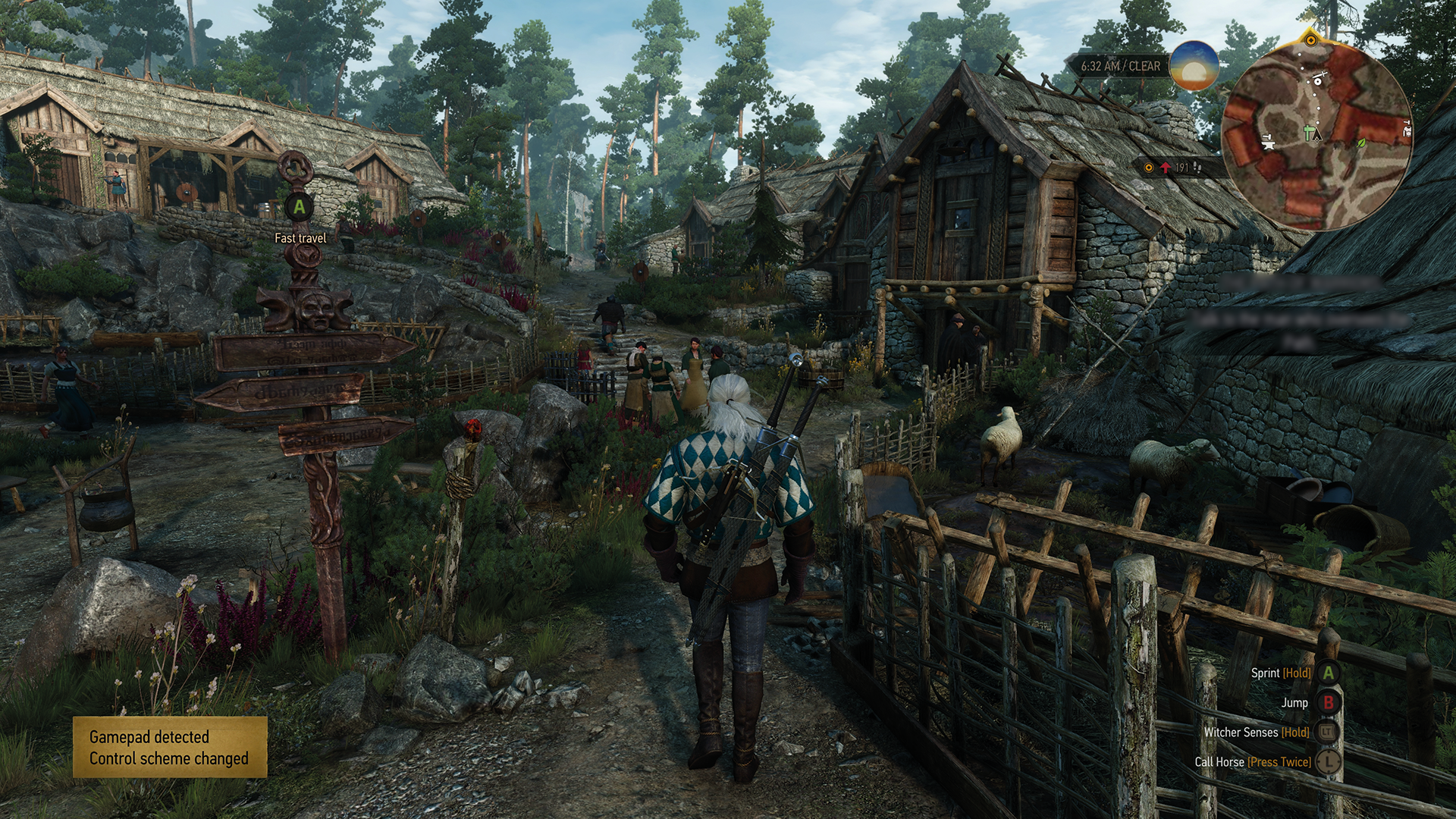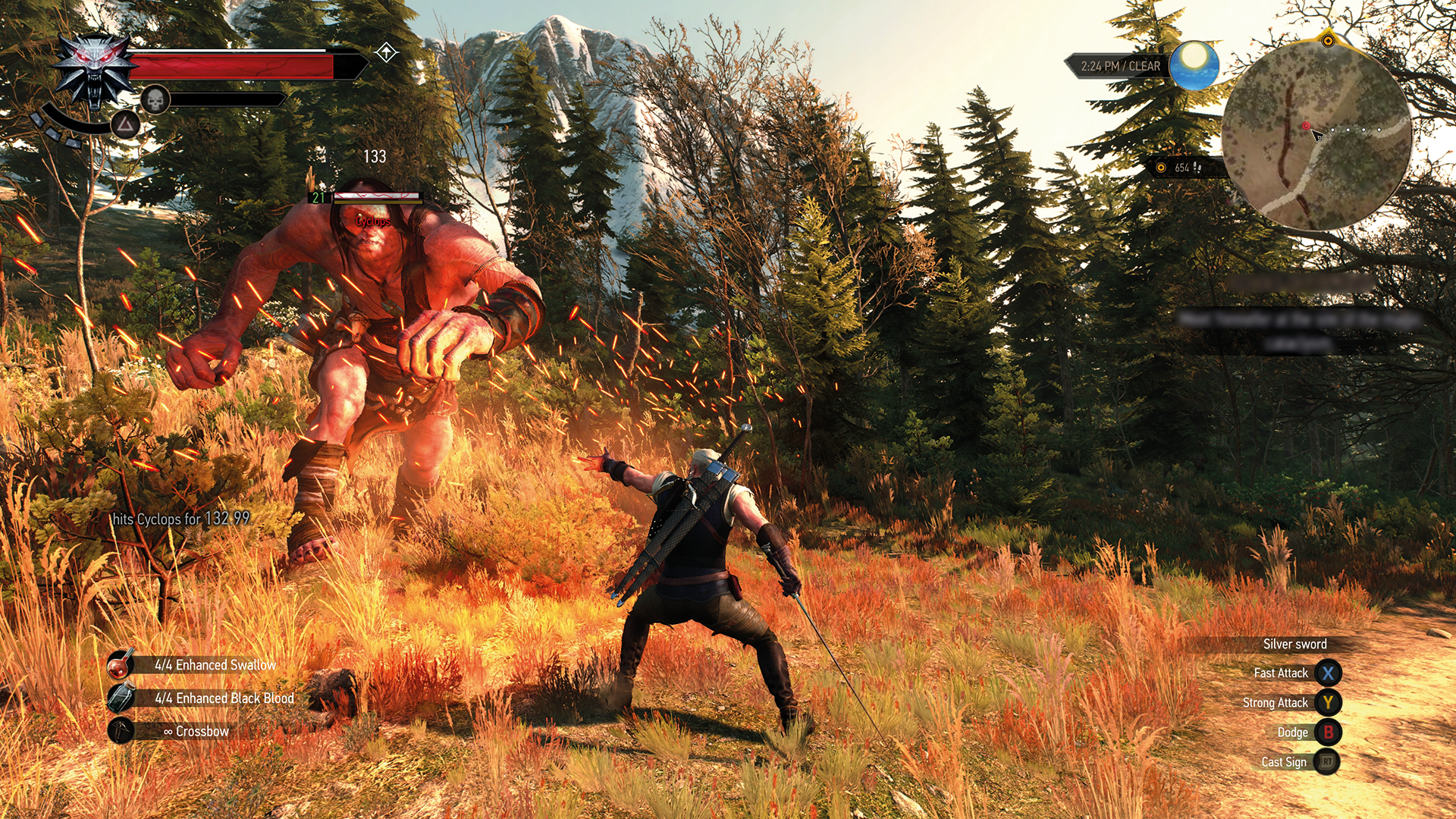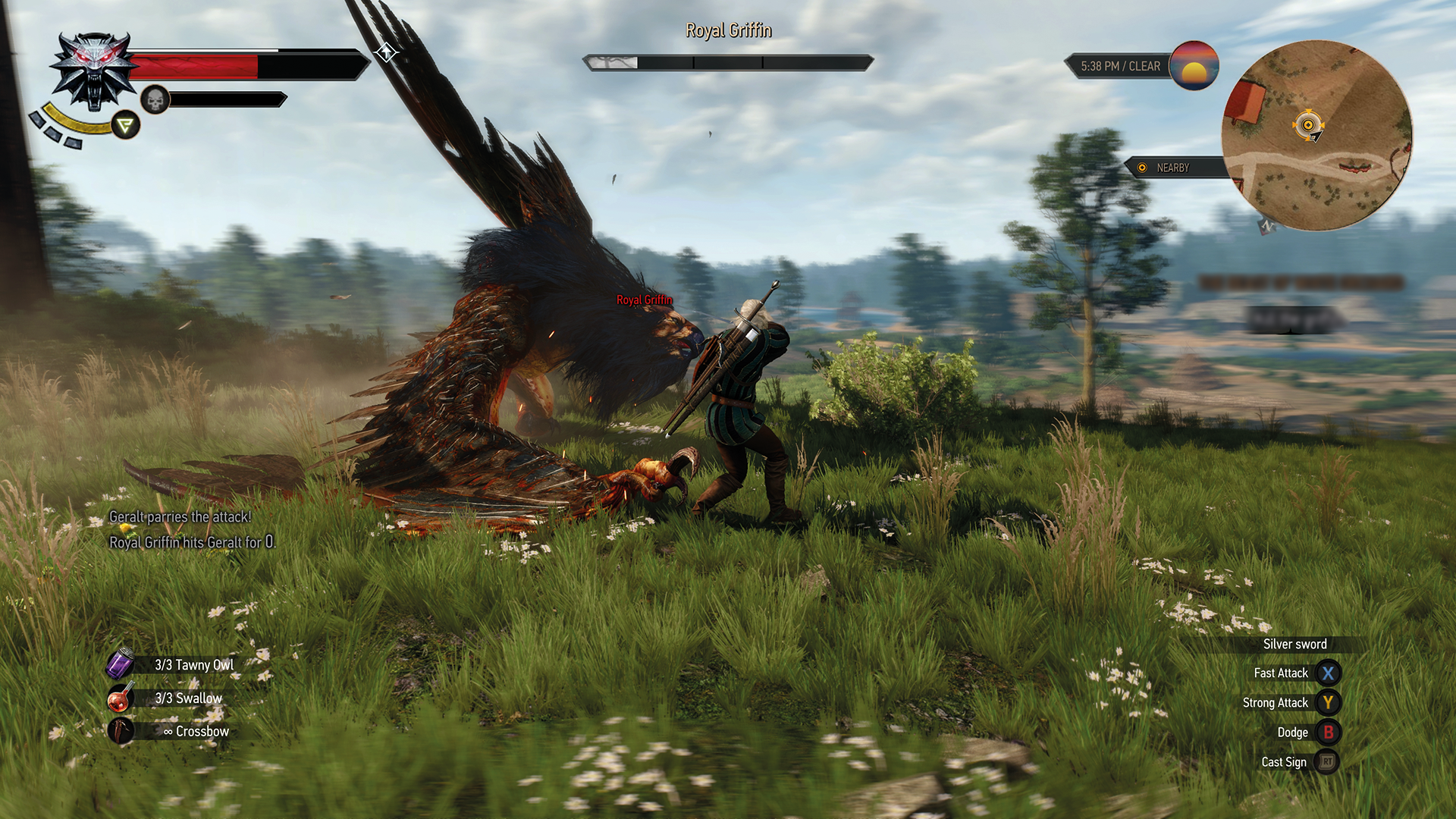The Witcher 3: 5 observations from the full game

We can't get our Witcher 3 review up today for reasons explained here, but I've been playing the PS4 build for the last couple of days. I can't speculate about how the console version performs next to the PC version (except to note that the console version runs well enough, only occasionally dipping below 30 frames per second, pre day one patch), but I can say some other things about the game, and those other things are listed below.
The Northern Realms Are Bleak
Fantasy RPGs tend to be melodramatic, to the extent that some of their darker themes are obscured by the usual hoity-toity thee-and-thy nonsense. Skyrim, Dragon Age: Inquisition and Pillars of Eternity all take place in worlds where humankind’s very existence is at stake—and all manage to create some semblance of tension—but they’re not dark. They feel whimsical next to The Witcher 3.
Make no mistake: some of the characters you’ll encounter, and some of the locales you’ll visit in the Northern Realms, are incredibly bleak. It’s a cliche to compare epic fantasy adventures to Game of Thrones (and The Witcher itself is based on a series of novels), but there were a handful of scenarios in The Witcher 3 that made me squirm. Certain enemies and NPCs are horrible to look at, but do a little in-game research about their origins and you’ll be rewarded with even more horror.
Which is an excellent thing. The Witcher 3 is a very violent and very adult RPG, with laboured emphasis on the word “adult”. This world is genuinely destitute. Sidequests are less “collect five Nirnroot” and more “save helpless elderly lady from the ruthless thugs burning her house down”.
Depictions of poverty are unrelenting, especially in one early sequence where a drunken baron lords it over a swampland slum. You’ll be forced to make some decisions that will pull at your moral compass in some ethically charged ways, and there are several instances where the utilitarian option may not be the most sensible one.

The Northern Realms Are Beautiful
It’s well known by now, but the Northern Realms isn’t a seamless map like Skyrim. It’s a handful of massive sections, with the game’s lore necessitating loading screens due to the distance between each. If that puts you in mind of Dragon Age: Inquisition, then you’re only halfway there: the two major regions of the map feel bigger than those in DA:I, and they’re the most lifelike pastoral open world settings I’ve seen in a video game—and I played it on PS4.
Mood is where The Witcher 3 really shines: the weather effects, the wind in the trees, the boggy dirt roads and tumbledown cottages… none feel programmed or designed. None feel “gamey” (and some problems arise there, which I’ll get to later). You won’t be jumping to and from them at will—legwork is required.
Keep up to date with the most important stories and the best deals, as picked by the PC Gamer team.
You’ll start out in the relatively serene White Orchard region, but soon move on to Velen where the full extent of The Witcher’s melancholy beauty becomes apparent. From there you’ll visit another major region called the Skellige Isles. You can fast travel from road signs in most major locations, but you can’t just warp from the middle of nowhere. You can sail on small boats along Velen’s wide riverbeds or between the Skellige Isles islands, or you can call upon your (sometimes recalcitrant) steed Roach.
While Velen is rife with poverty, crime, miserable people and ravenous wolves, you’ll want to take the time to admire the scenery, and the sunsets in particular are gorgeous. Just take some rejuvenating raw meat in case you get chewed up a bit, okay?
Geralt Is A Heavy Old Lunk
Those familiar with The Witcher 2 will know this, but it’s worth mentioning for everyone else: Geralt is a big, cumbersome, burly old lunk. If you’ve poured hours into Dragon Age or Souls games of late, it’ll come as a rude shock. Geralt’s turning circle is tank-like and his movements seamlessly animated, meaning the combat and even exploration can feel a bit syrupy at first. It initially feels unresponsive—and an unpredictable lock-on camera doesn’t help the issue—but once you understand the rhythm of the combat it’ll become second nature. It’s not a problem per se, just a learning curve.
Combat scenarios vary dramatically, but I found myself rolling around like a fool, mixing up Geralt’s five sign abilities (fire, persuasion, shield, telekinetic blast and a magical trap) with quick sword flourishes. Just be wary of your surrounds: the game’s environments are so detailed that you’ll find yourself wedged on decorative objects at times, and it invariably frustrates.
You won’t be able to brute force most enemies even if you’re well-levelled: rolling and in some cases parrying will be essential, and besides, levelling in The Witcher 3 is a slow process. You don’t get XP for merely slaying enemies: you’ll get it for quest progress. The progression system is a bit unusual too—you have a wide range of trees to upgrade, but each tree needs to be equipped. You start the game with three of these slots, but you’ll get more. Thankfully these can be slotted in and out as you desire, but it’s worth specialising early on if you want to make things easier. There’s plenty of time to branch out later.

The Witcher 3 Is Not A Fashion Contest
For those still warm from the glow of Dragon Age: Inquisition or Dark Souls 2, you may be disappointed to hear that The Witcher 3 is all about Geralt. Seems pretty obvious, but you won’t be decking Geralt out in fancy mage gowns or giving him pigtails. You’re a tough guy Witcher and that’s that, and there’s not much satisfaction in seeing him in other, more shiny shades of grey or brown armor. In other words: character customisation is basically non-existent in The Witcher 3, in a cosmetic sense. You can choose not to shave though, which is nice.
That doesn’t mean you’ll have no control over the type of Geralt you want to be: dialogue options sometimes let you choose between being “gruff and to the point”, “gruff and slightly charitable” or “gruff and contemptuous of all mankind”. While there’s no reductive morality system, these branching paths will usually hinge on what you determine is the best course of action. Naturally, the best course of action rarely works to the benefit of everyone, and in true dark fantasy fashion, it’s usually the weak who suffer. These decisions will also affect dialogue in less measurable ways, like, for example, your position on whether a domestically violent man deserves any sympathy. Oh boy, does it get complicated. It's a nasty game.
It’s intrigues like this—and the sordid, compromised nature of nearly all of the characters you’ll encounter—that makes The Witcher 3’s missions feel more like small feature films, and it’s the way Geralt comports himself in each of these that determines how much he reflects you. You won’t be able to shift Geralt’s ingrained dispositions, but you can influence them in interesting ways.
The Witcher 3 Is Long
You’re going to be playing this game for a very long time. The main quests are long and winding, and sometimes you’ll have several running side-by-side. You might be tempted to burn through the major ones when you hit White Orchard but don’t: be careful to explore, be sure to collect resources (mainly crafting and potion supplies) and take the time to understand why the Northern Realms are so crappy for the people living there.
This is a game meant to be played slowly and savoured, and if you do so you’ll find that later on, when you really need potions and crafting supplies, you’ll have them because you spent the time getting to know your world. Your carry weight is surprisingly huge compared to most other recent RPGs, so pick everything up and worry about your load later (no need to carry around dozens of mugs, though).
The way quests are handled is charitable: while long, you can dip in and out at will. That means if you’re having difficulty with a tough enemy you can leave, start a new quest, and revisit the quest at that point later on. This probably doesn’t apply to the deepest of dungeons (you’ll need to make your way back!) but overall, The Witcher wants you to be the judge of how best to carry out your adventure, and there are surprisingly few difficulty spikes in a game that, let’s face it, will be pretty tough for non-RPG players at first. The Witcher 3 is most rewarding when you take the time to let the finer details sink in.

Shaun Prescott is the Australian editor of PC Gamer. With over ten years experience covering the games industry, his work has appeared on GamesRadar+, TechRadar, The Guardian, PLAY Magazine, the Sydney Morning Herald, and more. Specific interests include indie games, obscure Metroidvanias, speedrunning, experimental games and FPSs. He thinks Lulu by Metallica and Lou Reed is an all-time classic that will receive its due critical reappraisal one day.

